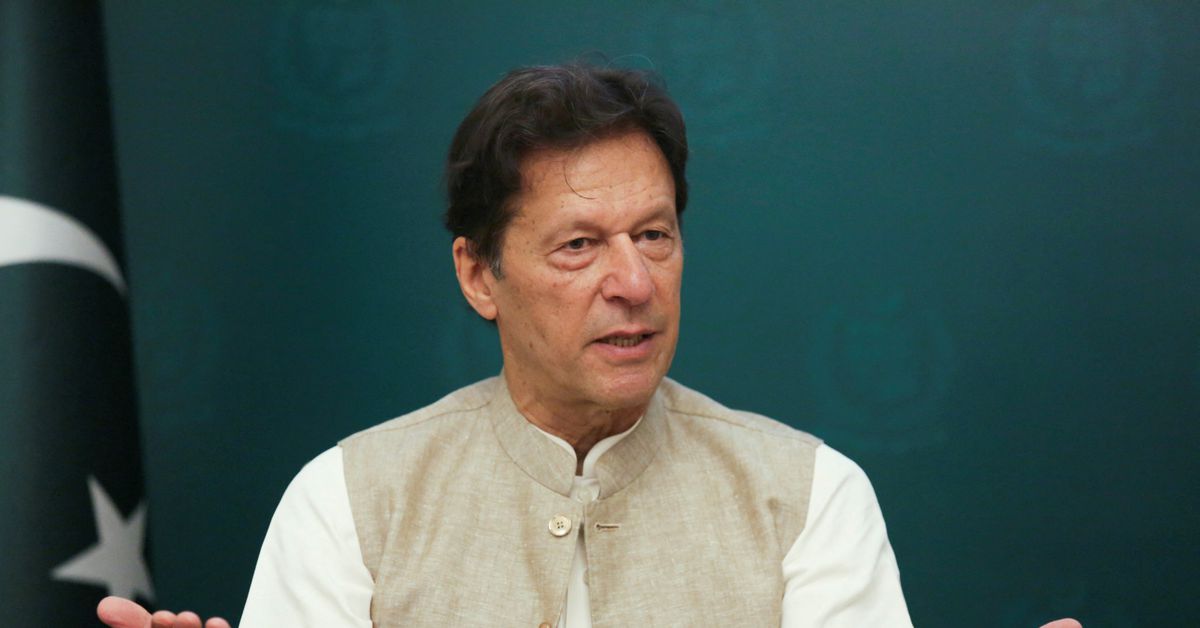Pakistan government ally quits coalition ahead of vote to oust PM

Khalid Maqbool Siddiqui, leader of the Muttahida Qaumi Movement (MQM), gestures during a joint press conference along with the leaders of the Pakistan Democratic Movement (PDM), an alliance of political opposition parties, in Islamabad, Pakistan March 30, 2022. REUTERS/Akhtar Soomro
Summary Prime Minister Khan loses majority after ally’s defection
Opposition calls on Khan to resign before vote
Prime minister’s aide says he will fight to the end
ISLAMAB, March 30 (Reuters) – A main ally of Pakistani Prime Minister Imran Khan quit his ruling coalition on Wednesday and joined forces with the opposition seeking to oust him, robbing Khan of his majority in parliament as he faces a looming no-confidence vote.
Former cricket star Khan, 69, has been facing mounting domestic criticism of his performance, including the management of an economy beset by high inflation and rising deficits.
An increasingly united opposition has moved to force him from office in a no-confidence vote due between Thursday and Monday, in which support from Khan’s allied parties was critical. read more
Register now for FREE unlimited access to Reuters.com Register
The leader of Khan’s main parliamentary ally the Muttahida Qaumi Movement (MQM), Khalid Maqbool Siddiqui, announced his party was joining the bloc looking to oust Khan following a written agreement between the two sides.
“I announce that we are with you in this change,” Siddiqui said at a news conference alongside opposition leaders on Wednesday.
Khan’s party does not have a majority in the National Assembly by itself and has relied on the support of coalition allies, the biggest of which was the MQM, based in the southern port city of Karachi. read more
“We have sent our resignations to the prime minister,” Amin-ul-Haq, a member of Khan’s cabinet from the MQM, told local television channel Geo News.
Khan’s ouster would likely mean another round of instability in the nuclear armed south Asian country, in which the military has a long record of intervening in politics and no prime minister has completed a full five-year term in its history.
CALLS TO QUIT
Opposition leaders Shahbaz Sharif and Bilawal Bhutto Zardari, standing alongside MQM’s Siddiqui, called on Khan to resign before the vote now that he had lost his majority with the defection of the MQM.
“It is a tradition that if you lose majority, you should step down,” said Sharif, who is widely believed to be the opposition’s candidate for the next prime minister should Khan be ousted.
“We have 175 votes against the required 172,” said another opposition leader, Fazl-ur-Rehman, after the MQM’s decision to quit the ruling coalition.
However, Khan’s aides said he would not back down or resign.
“He will not resign. He will fight till the last ball,” Interior Minister Sheikh Rasheed Ahmad told reporters after a cabinet meeting on Wednesday. “He will probably be present in the parliament during the vote on Sunday.”
Ahmad said Khan would also be giving a televised address to the nation on Wednesday. However, the prime minister’s office later said the address had been cancelled.
Khan has said on numerous occasions in recent days that there was a “foreign conspiracy” to oust him because he had taken what he termed independent foreign policy decisions.
In a public rally earlier this week, Khan waved around what he claimed was a letter that was evidence of a threat given to his government. He did not say who the letter was from, but indicated it pertained to a Western country.
On Wednesday, local media reported that Khan met select journalists to share the contents of the letter to press his point.
Under Khan Pakistan, a traditional ally of the West, has moved closer to China, while relations with Washington have deteriorated.
Register now for FREE unlimited access to Reuters.com Register
Reporting by Asif Shahzad and Gibran Peshimam in Islamabad and Syed Raza Hassan in Karachi; Editing by Sanjeev Miglani, Robert Birsel, Nick Zieminski and Alex Richardson
Our Standards: The Thomson Reuters Trust Principles.






